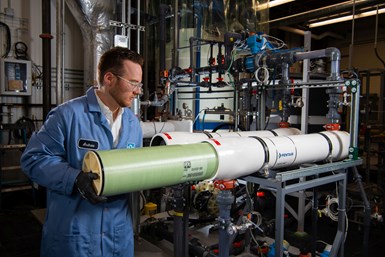Ultrafiltration Membranes, Filter Elements for Improved Industrial Water Reuse
Ultrafiltration membranes help with water reuse in a variety of applications.

Photo Credit: PPG
PPG has added a high-performance ultrafiltration (UF) membrane and filter elements for industrial process water and wastewater applications to its portfolio. The UF membrane continues PPG’s line of microfiltration (MF) membranes and filter elements, which are designed to remove oil and other contaminants so process water and wastewater can be disposed of or reused safely and economically. In addition to assisting with improved water reuse, the membranes and filter elements play a role in addressing global water scarcity.
Incorporating an antifouling treatment technology, PPG’s UF membranes are superhydrophilic, or water loving, which inhibits trace amounts of oil, grease and other tough-to-filter contaminants from fouling the membranes and filter elements. As a result, the service life of membranes can be extended, reducing costs through lower maintenance and replacement needs. Aided by the antifouling treatment, PPG membranes can provide plant managers and maintenance engineers with a solution that helps their filtration systems perform better and last longer with improved cleanability.
“Our antifouling treatment represents a significant technical advancement with potential benefits in multiple industries,” says Lisa Walters, PPG filtration segment manager, specialty coatings and materials. “The traditional belief is that membranes are not well suited for removing oil and grease because of their tendency to foul. PPG filtration membranes have an exceptional ability to separate emulsified contaminants from water.”
PPG’s high-performance MF and UF membranes separate oil, grease and emulsified contaminants from higher volumes of industrial process water. This can reduce the number of filters and amount of manufacturing floor space needed to recover the water for reuse. Potential applications for PPG filtration membranes include industrial process water and wastewater, from oil and gas to automotive and industrial paint lines to graywater treatment.
“The ability to clean and reuse industrial process water is beneficial in so many ways, not just to the companies that recapture this valued resource but also for the environment by reducing demands and stress on freshwater supplies,” Walters says. “Our sustainably advantaged membranes and the enhanced performance provided by our new UF offerings and MF membranes with antifouling treatment offer another great example of how PPG products protect and beautify the world.”
Related Content
-
Hubbard-Hall Acquires BioConversion Technology
The acquisition adds experience and biologics to the AquaPure product line.
-
NASF/AESF Foundation Research Project #122: Electrochemical Approaches to Treatment of PFAS in Plating Wastewater - 7th Quarterly Report
The NASF-AESF Foundation Research Board has selected a project on addressing the problem of PFAS and related chemicals in plating wastewater streams, studying PFAS destruction via electrooxidation and electrocoagulation. Our last report described the results from experiments of EO with a Magnéli phase Ti4O7 anode on the degradation of eight perfluoroalkyl acids (PFAAs). In this seven quarter report, we describe work to further explore how the degradation of different PFAAs are related to their molecular structures.
-
Novel Wastewater Treatment Targets Micropollutants
Swiss wastewater treatment technology provider Oxyle specializes in advanced wastewater treatment for removal of highly persistent micropollutants such as PFAS.















